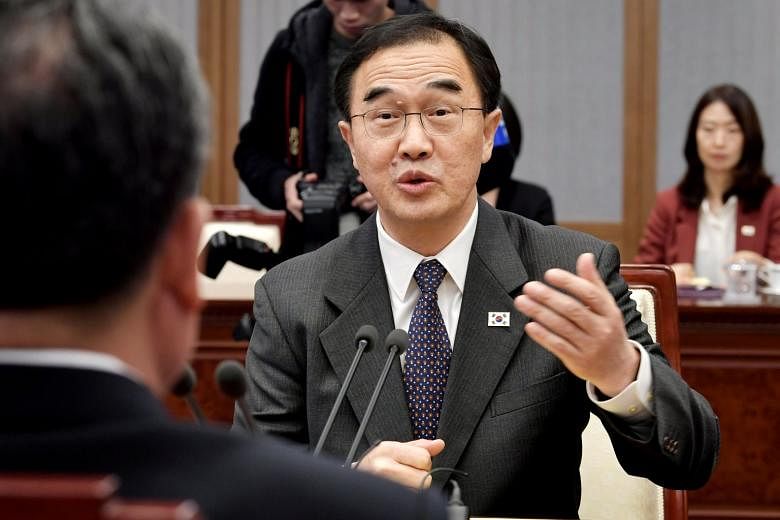WASHINGTON - South Korea will not reopen its industrial complex with North Korea until denuclearisation happens and all inter-Korean projects will abide by current international sanctions, said South Korea unification minister Cho Myoung-gyon in Washington DC on Thursday (Nov 15).
Mr Cho, whose five-day trip to the US capital comes amid stalled talks between the United States and North Korea, acknowledged concerns in Washington's foreign policy circles that the two allies were out of step with each other on the denuclearisation on North Korea.
But he sought to dispel the notion that the increasingly close relationship between the two Koreas would undermine US efforts to get the North to give up its nuclear programme.
"I understand some critics argue that the progress in inter-Korean relations has been way too fast while there has been no progress in North Korea's denuclearisation.
"The situation now is similar to the natural flow of a river that was once blocked for long time," said Mr Cho in his keynote address at Korea forum organised by the Woodrow Wilson International Center for Scholars.
He added: "We're constantly highlighting the importance of North Korea giving up its nuclear weapons if it wants to have economic development... So we can say that South Korea and the US are on the same page to achieve the same goal.
Mr Cho said he hoped that the US and North Korea could soon reschedule a meeting between US Secretary of State Mike Pompeo and his North Korean counterpart Kim Yong Chol, which was to have been held last week but which North Korea cancelled abruptly.
The minister also explained South Korea's position in pushing for a declaration to the end of the Korean War, something both Koreas want but which the US is wary of, as it reckons such a declaration may lead to North Korea demanding the withdrawal of American troops in South Korea.
A declaration would shore up North Korean leader Kim Jong Un's position within the upper echelons of North Korean leadership and give him the political legitimacy to engage with the US and South Korea, said Mr Cho.
"By having this end of war declaration, Kim Jong Un will have stronger legitimacy to push for actual action for denuclearisation, which will bring a breakthrough in the negotiation for denuclearisation. This political declaration will not make a significant change in terms of reality," he added.
America's former top diplomat on North Korea, Mr Joseph Yun, agreed in a later panel that an end of war declaration would go some way in building confidence between the US and North Korea.
"Honestly, the alliance relationship between the US and South Korea is strong enough that a political document like an end of war statement is not going to damage that in any meaningful way," said Mr Yun, who was US Special Representative for North Korea Policy from Oct 2016 till March this year.
He and fellow panellists had a frank, in-depth discussion on the differences between the American and South Korean approaches to denuclearisation, as well as the fundamental problems that were hampering US-North Korea negotiations.
North Korean studies professor Koh Yu-hwan of Dongguk University in Seoul, a unification policy advisor, said: "The South Korean government through many channels has confirmed that North Korea has a strong commitment to denuclearisation, but the US doesn't believe that."
Countering this view, Mr Yun said: "South Korea needs to be more balanced... in convincing each party on where they are, instead of coming to Washington and putting out strong argument just to believe Kim Jong Un."
As for Americans, they were sending Pyongyang mixed signals on what they regarded as an acceptable timeline for denuclearisation, and North Koreans did not seem ready to engage in a process given their eleventh-hour cancellation of last week's talks, he added.
More fundamentally, he said, the US was too fixated on the issue of whether North Korea would denuclearise.
"We have to ask: how do we move step by step so that at the end of the day, they will denuclearise? To ask them whether they will denuclearise is like going on a first date and asking, will you marry me? That's not going to happen.
He added: "It's great to have the goal of denuclearisation... but I think for the US and North Korea to move away, we need a process, we need a step-by-step approach, we need things that will build confidence. But I'm afraid we're going the wrong way about it."
Mr Yun said the ball was now in America's court, but that Washington's demands so far had been unworkable.
"We know what we want North Korea to do, which is denuclearise... but that's not going to get anywhere until we show the North Koreans what the US is prepared to do. And I don't think quite honestly the administration has come to terms on what it can do. So you are hearing we are not going to do anything until denuclearisation is complete. That's a non starter," said Mr Yun.
He suggested, for instance, that America for a start accept Pyongyang's dismantling of its Yongbyon nuclear facility for some lifting of sanctions on oil imports and sending workers to China and Russia.
Retired veteran diplomat J Stapleton Roy, who closed the forum, said: "There's total disagreement on the US side as to what to give. Some people don't want to give anything but want to get everything from North Korea."
Mr Roy, a former ambassador to several Asian countries including China and Singapore, added that the US would also have to acquiesce to North Korea's status as a nuclear power without formally acknowledging it.
Above all, said Mr Roy, "sustaining this process of engagement is necessary - but extraordinarily difficult - because the alternatives to talking are all bad."


